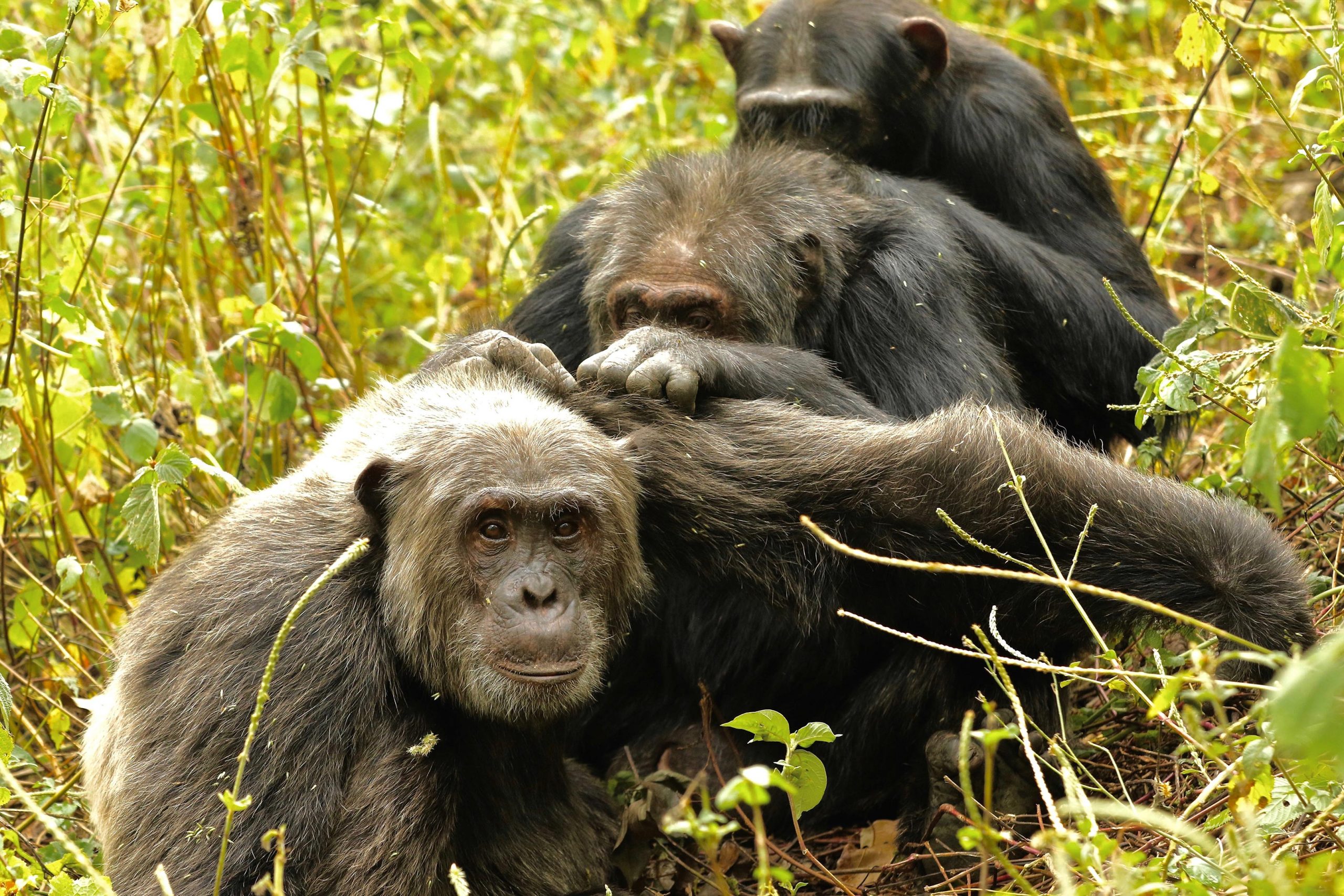Three men groom each other in a chain – Likizo (a younger man) groomed Big Brown (an older man), who groomed Lanjo (another younger man). Photo credit: John Lower
New study shows evidence that nonhuman animals choose whom to socialize as they age.
No new friends and no drama.
As people get older, they tend to prefer small groups of meaningful, established friendships rather than new ones. People are also more prone to positive relationships than those that create tension or conflict. These behaviors were thought to be unique to humans, but it turns out that chimpanzees, one of our closest living relatives, have these traits too. Understanding why scientists can help better understand what healthy aging should look like and what is triggering this social change.
The work is described in the journal science and is written by a team of psychologists and primatologists, including current and former researchers at Harvard’s Department of Human Evolutionary Biology.
The study is based on 78,000 hours of observation between 1995 and 2016, during which the social interactions of 21 male chimpanzees between the ages of 15 and 58 years in Kibale National Park in Uganda were examined. It shows what is believed to be the first evidence that nonhuman animals actively choose who to socialize with as they age.
The researchers only looked at male chimpanzees because they have stronger social bonds and are more likely to have social interactions than female chimpanzees.
When analyzing a set of data, the researchers found that the chimpanzees exhibited largely the same behavior that aging humans display. For example, the older chimps they studied preferred to spend more time with and grooming chimpanzees with whom they had made mutual friends over the years, while younger chimpanzees had more one-sided relationships in which grooming was not always was returned. Older men were also more likely to spend more time alone, but interacted with more important social partners such as their aging mutual friends. And like older people seeking tranquility, the chimpanzees also showed a shift from negative to more positive interactions as they reached their twilight years. The preference is known as a positive trend.
“The really cool thing is that we found that chimpanzees display these patterns that are very similar to humans,” said Alexandra Rosati ’05, assistant professor of psychology and anthropology at the University of Michigan and a lead author for the paper.
Through future research that may help determine whether these behaviors represent the normal or successful course of aging, she added. It can serve as a model or base.
“Understanding the biology of aging is really urgent,” said Rosati. “More people are living longer than in the past, which can change the dynamics of aging.”
Rosati is a former assistant professor and visiting scholar in the HEB department from which the study originated. Other Harvard-affiliated authors of the paper include Zarin Machanda ’04, AM, ’09, Ph.D. who is now an Assistant Professor at Tufts University, Melissa Emery Thompson ’00, AM, ’05, Ph.D. who is now an Associate Professor at New Mexico University, Lindsey Hagberg ’17 who is now a medical student at Washington University, and Richard W. Wrangham, Ruth B. Moore Professor of Biological Anthropology and Founder and Co-Director of the Kibale Chimpanzee Project.
Machanda and Thompson worked as PhD students in Wrangham’s laboratory and are currently co-directors for the Kibale Project, which includes other authors including Martin N. Muller, a former postdoctoral fellow at HEB. The project began as Hagberg’s thesis.
The study tested people’s origins, prioritizing close, positive relationships during aging and whether this was really triggered by a theory known as socio-emotional selectivity. The term suggests that the central process that drives social selectivity during aging is due to people becoming aware that their time is running out and wanting to make the most of it.
The results of the study suggest that there is more to understand.
“While chimpanzees are very smart, they don’t understand that they’re going to die,” Wrangham said. “Much more likely, something else is going on with chimpanzees to explain why their relationships become more positive as they age, and then the question is what is true of chimpanzees as well as humans.”
One of the observations that led the researchers to their conclusions was an examination of proximity and grooming habits. Older chimpanzees preferred to sit near those who preferred to sit near them. These are classified as mutual friendships, while one-sided friendships exist when one chimpanzee prefers to sit around another chimpanzee, but that other chimpanzee does not share the habit.
Fifteen-year-old chimpanzees had an average of 2.1 one-sided friendships and 0.9 mutual friends, while 40-year-old chimpanzees were almost completely ignorant of one-sided friendships (their average was 0.6), but many mutual friends had an average of three. When looking at grooming habits, the researchers found that the older chimpanzees put more energy into their relationships with mutual friends.
“We see people have these more one-sided friendships, and as they get older they really spend time with people who are reciprocating,” said Machanda, who was the newspaper’s other lead author. “When you have that kind of mutual friendship, you actually care for that person more, so these older chimps have these mutual friendships and they actually do care for these people quite a bit. You are really invested in these relationships. ”
The scientists were not entirely surprised by their results. Part of this is that chimpanzees and humans are already very similar in terms of social organization and social choices. After all, chimpanzees and bonobos share 99 percent of theirs DNA fellow men.
“Chances are we’re seeing systems of behavior that were evolutionarily passed down to our common ancestors about seven or eight million years ago,” said Wranham.
Reference: October 22, 2020, science.
DOI: 10.1126 / science.aaz9129



